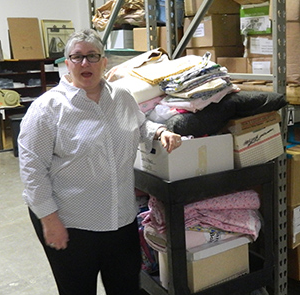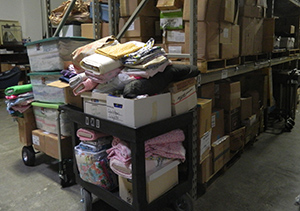DALLAS—Woman’s Missionary Union in Texas provides “blessings by the yard” by collecting flannel to create reusable pads for women in South Asia and other countries who lack access to disposable feminine hygiene products.
“Christian seamstresses in South Asia can make the pads, but they cannot get absorbent flannel in their country,” said Carolyn Porterfield, Texas WMU missional lifestyle strategist for multicultural groups.
Collecting flannel for South Asia
 Carolyn Porterfield, missional lifestyle strategist with Woman’s Missionary Union of Texas, shows the flannel women around Texas have donated to provide reusable menstrual pads for women in South Asia and elsewhere who lack access to disposable feminine hygiene products. (Photo / Ken Camp)So, Texas WMU launched its “blessings by the yard” emphasis, seeking to collect 715 yards of flannel the South Asian women can use to make 10,000 menstrual pads. The organization challenged Baptist Women in Texas to bring flannel to its annual meeting and missions celebration, April 8-9 at Austin Baptist Church in Austin.
Carolyn Porterfield, missional lifestyle strategist with Woman’s Missionary Union of Texas, shows the flannel women around Texas have donated to provide reusable menstrual pads for women in South Asia and elsewhere who lack access to disposable feminine hygiene products. (Photo / Ken Camp)So, Texas WMU launched its “blessings by the yard” emphasis, seeking to collect 715 yards of flannel the South Asian women can use to make 10,000 menstrual pads. The organization challenged Baptist Women in Texas to bring flannel to its annual meeting and missions celebration, April 8-9 at Austin Baptist Church in Austin.
Texas WMU received about 600 yards of flannel prior to the annual meeting and already sent about 200 yards to South Asia.
Teaching women about their own bodies
Three years ago, Texas WMU learned about the pad project from mission partners at the Minnesota-Wisconsin Baptist Convention. They discovered women in certain cultures not only cannot afford products for their menstrual cycle, but also do not understand how their own bodies function.
“In some parts of the world, women call it the week of shame,” Porterfield said. Teenaged girls cannot attend school, and women are unable to leave their homes. They use scraps of paper or dirty rags, or they simply do without.
“Some of these women do not understand why they bleed every month,” she said.
Sign up for our weekly edition and get all our headlines in your inbox on Thursdays
So, a missionary nurse created a teaching module that provides basic information about women’s health issues that can be contextualized for varied cultures, along with simple lessons from Scripture.
“By teaching the story of how Jesus received the woman with the ‘issue of blood,’ they learn how Jesus values women in a culture where women feel marginalized and shamed,” Porterfield said.
Opportunities to present the gospel
One missionary in South Asia described how the pad project provided opportunities for young women in orphanages to hear the gospel.
 WMU of Texas challenged women to contribute 715 yards of flannel that Christian seamstresses in South Asia can use to make 10,000 reusable menstrual pads.“At the last orphanage we visited, the girls were very poorly cared for, and the pad project meeting allowed them a time to share with the presenter and ask questions relating to their physical health,” the missionary wrote. “Most importantly, all of the girls heard the powerful gospel … and the girls were encouraged to cry out to their Creator in their times of need.”
WMU of Texas challenged women to contribute 715 yards of flannel that Christian seamstresses in South Asia can use to make 10,000 reusable menstrual pads.“At the last orphanage we visited, the girls were very poorly cared for, and the pad project meeting allowed them a time to share with the presenter and ask questions relating to their physical health,” the missionary wrote. “Most importantly, all of the girls heard the powerful gospel … and the girls were encouraged to cry out to their Creator in their times of need.”
In one area, a missionary used the teaching module and provided pads to young women who are part of an artisan group that produces handicrafts sold through WorldCrafts, the WMU fair-trade initiative.
Missionaries also have used the pad project to present the gospel to women in unreached people groups as part of a church-starting strategy.
Although the primary Southern Baptist missionary contact in South Asia for Texas WMU is returning to the United States as part of the International Mission Board’s downsizing, missions personnel have trained local Christian women to present the lessons and distribute the pads, so the work will continue.
Widespread reach and involvement
Since Texas WMU became involved in the pad project three years ago, they have helped provide thousands of pads to women in three South Asian nations, as well as Uganda, Honduras, Peru and South Africa.
Students at Baylor University’s Louise Herrington School of Nursing have participated, and a doctoral student there may introduce the pad project in Ethiopia, where she spent most of the last month.
“Women from Hispanic, Anglo, African-American and Vietnamese churches have all contributed,” Porterfield said. Seamstresses at Redeemer Vietnamese Baptist Church in Plano made about 6,000 pads.
“Women understand women’s needs, and they say, ‘We can do that,’” she said. “It’s a way to use their giftedness to bless another woman.
“God says, ‘Look at the world through my eyes.’ It is a way we can let women know there is no shame in being made as a woman. It allows us to say to them we have enjoyed the blessing of being loved by God, and they can, as well.”















We seek to connect God’s story and God’s people around the world. To learn more about God’s story, click here.
Send comments and feedback to Eric Black, our editor. For comments to be published, please specify “letter to the editor.” Maximum length for publication is 300 words.